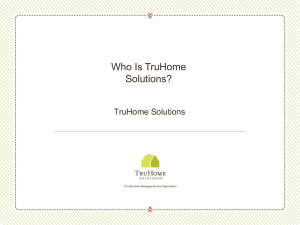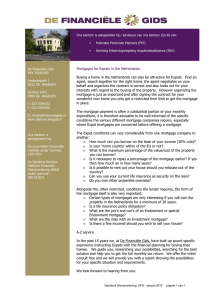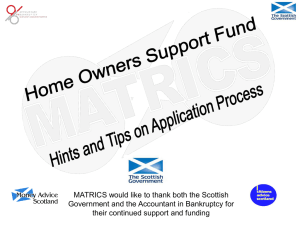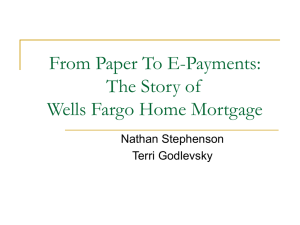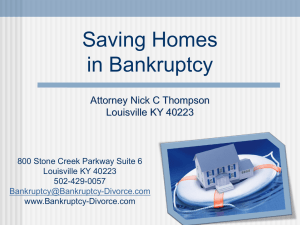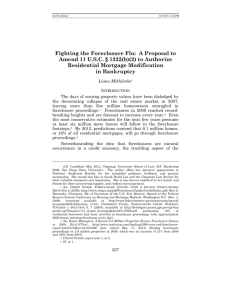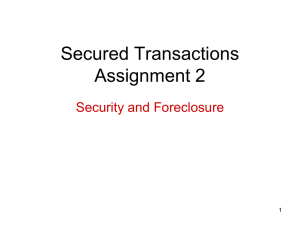Bankruptcy Issues in Foreclosure Actions
advertisement
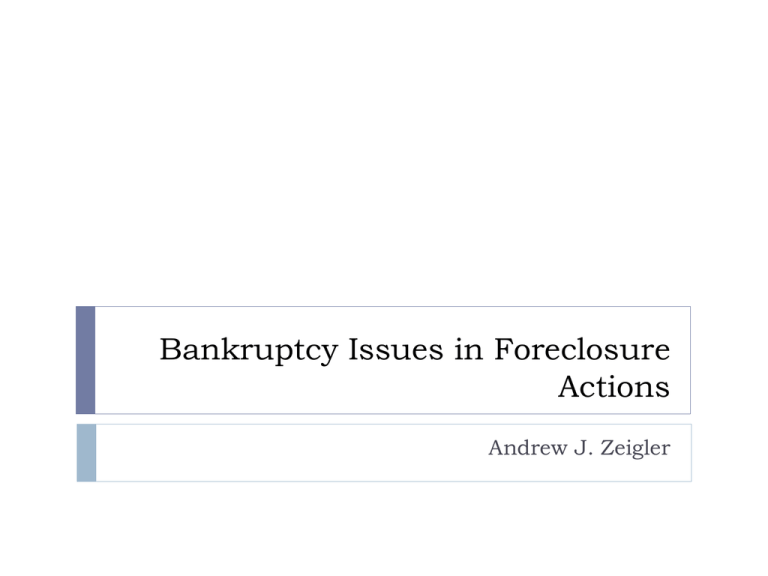
Bankruptcy Issues in Foreclosure Actions Andrew J. Zeigler Bankruptcy – Automatic Stay 11 U.S.C. §362 Once a bankruptcy petition is filed all collection activities must stop immediately. Applies to all creditors Applies to acts against the Debtor. Applies to acts against property. Wage Garnishment Foreclosure, Repossessions Creditor can be sanctioned by the Court if they violate Different Types of Bankruptcy Liquidation Chapter 7 Reorganization Chapter 9 – Adjustment of Debts for Municipalities Chapter 11 – Reorganization Chapter 12 – Adjustment of Debts for Family Farmers and Fisherman Chapter 13 – Adjustment of Debts for Individuals Chapter 7 - Eligibility Eligibility All Individuals must complete an approved credit counseling course within 180 days prior to filing a petition Means Test – Applies to All individual Consumer Debtors Median Income (As of November 15, 2013) Household Size 1 – $43,057.00 Household Size 2 – $53,075.00 Household Size 3 – $60,679.00 Household Size 4 – $76,381.00 The Court can still determine the Debtor has the ability to pay even if they pass the means test. Exempt Property Ohio Revised Code 2329.66 Residential Property – $132,900.00 Motor Vehicle – $3,675.00 Cash – $450.00 Household Goods – $12,575.00 ($575.00 in one item) Jewelry – $1,550.00 Child Tax Credit/Earned Income Credit from Tax Refund Personal Injury Claims – $23,000.00 General “Wild Card” – $1,225.00 Wages – 75% of Disposable Earnings Workers Compensation, Unemployment, Retirement Accounts, 529 Accounts Chapter 7 – Secured Debts Options for Secured Debts in Chapter 7 Surrender Reaffirm Keep the property and continue to make payments under the original agreement Redeem Give the property back to the lender. Pay the lender the fair market value and retain the property Does not apply to real estate Pay and Retain Continue to make payments to lender as they are due Chapter 7 - Mortgages Mortgage debt is dischargeable in bankruptcy Cannot modify the terms of the mortgage without consent of the bank Even though debt is discharged the lien remains on the property Lender will typically not foreclose if debtor continues to make payments Recommend clients with mortgages in Chapter 7 “Pay and Retain” if they want to keep the house Chapter 13 – Eligibility A court supervised repayment plan All payments are made to a Chapter 13 Trustee Eligibility Any individual with regular monthly income Debt Limits Secured Debts less than $1,149,525.00 Unsecured Debts less than $383,175.00 Length of Plan is 36 to 60 months based on median income Chapter 13 – Who needs to file? Anybody who does not pass the “means test.” Anybody that has property that they might lose if they file a Chapter 7. Anybody that has a mortgage foreclosure or repossession and would like to keep the property. Anybody that has Income Tax Issues Anybody that is not otherwise eligible for a Chapter 7. Chapter 13 - Plan In addition to the documents required to file a Chapter 7 the Debtor must also file a proposed repayment plan. Must pay all disposable income for either 36 or 60 months. 36 Month – Under Median Income 60 Month – Over Median Income Automatic Stay is in effect for the entire length of the plan. Cannot exceed 60 Months Chapter 13 Plan – Curing a Mortgage 11 U.S.C. §1322(b)(5) A Chapter 13 Plan may “. . . provide for the curing of any default within a reasonable time and maintenance of payments while the case is pending on any unsecured or secured claim on which the last payment is due after the after the date on which the final payment under the plan is due” Example $1,000.00 monthly mortgage payment $6,000.00 behind Over 60 Months would have to pay $1,100.00 Chapter 13 – Anti-Modification Provisions 11 U.S.C. §1322(b)(2) “modify the rights of holders of secured claims, other than a claim secured only by a security interest in real property that is the debtor’s principal residence . . .” 11 U.S.C. §1322(c)(2) Notwithstanding 1322(b)(2) “in a case in which the last payment on the original payment schedule for a claim secured only by a security interest in real property that is the debtor’s principal residence is due before the date on which the final payment under the plan is due, the plan may provide for payment of the claim as modified . . .” Chapter 13 – Avoiding Second Mortgages In re Lane, 280 F.3d 663 (6th Cir. 2002) Pursuant to 11 U.S.C. §506 a Chapter 13 Debtor can avoid a wholly unsecured second mortgage Example 1: Example 2: House Valued at $100,000.00 First Mortgage = $102,000.00 Second Mortgage = $20,000.00 Can be avoided House Valued at $100,000.00 First Mortgage = $98,000.00 Second Mortgage = $20,000.00 Can Not be avoided Issue in these cases can become a battle of appraisers Chapter 13 – Avoiding other Liens Judgment Liens can be avoided pursuant to 11 U.S.C. §522(f) so long as they impair the homestead exemption State of Ohio Tax Liens can be avoided pursuant to In re Lane Federal Tax Liens can be partially avoided pursuant to In re Lane and 506 Chapter 13 – Mortgage Proof of Claim Mortgage company is required to file a proof of claim with the bankruptcy court in order to receive any payments from the Chapter 13 Trustee. Federal Rule of Bankruptcy Procedure 3001(c)(2)(C) If a security interest is claimed in property that is the debtor’s principal residence, the attachment prescribed by the appropriate Official Form shall be filed with the proof of claim. If an escrow account has been established in connection with the claim, an escrow account statement prepared as of the date the petition was filed and in a form consistent with applicable nonbankruptcy law shall be filed with the attachment to the proof of claim. Chapter 13 – Mortgage Proof of Claim Federal Rule of Bankruptcy Procedure 3001(c)(2)(D) If the holder of a claim fails to provide any information required by this subdivision (c), the court may, after notice and hearing, take either or both of the following actions: (i) Preclude the holder from presenting the omitted information, in any form, as evidence in any contested matter or adversary proceeding in the case, unless the court determines that the failure was substantially justified or is harmless; or (ii) award other appropriate relief, including reasonable expenses and attorney’s fees caused by the failure. The required Official form is attached. Chapter 13 – Claim Objection Attorney fees are not a permissible part of the claim on a principal residence. Court Costs actually expended are allowed Late Charges, BPO Fees, Inspection Fees are only allowed if the are reasonable and/or the work was actually done Foreclosure Title Costs can be objected to as unreasonable – class action pending on this issue in Ohio Forced Place Insurance may be unreasonable Additional objections may be raised if TILA, ECOA, HOEPA (may have Stern v. Marshall problems if third parties are brought in) Chapter 13 – Claim Objection Process Debtor will file an objection to the claim stating the reasons for the Objection Mortgage company has 30 days to respond If the mortgage company fails to respond to the objection and the claim is disallowed then the mortgage is void pursuant 11 U.S.C. §506 If the mortgage company responds court will set a status conference with the Trustee, discovery deadlines and a hearing will be scheduled. Chapter 13 – Claim Objection Process Ask mortgage company for documentation BPO Fees – Was this actually done Property Inspection fees – We need the name of the person that drove to the house as well as the pictures they took and the report they filed. Court Costs – Itemized list of Court Costs expended, are there are refunds coming back Title Costs – Bill from the title company Any other bogus charges Chapter 13 – Post-petition fees/expenses Federal Rule of Bankruptcy Procedure 3002.1(c) If mortgage company expends fees post-petition they are required to file another itemized form with the Court showing the fees and costs expended. These typically include the same types of charges that can be objected to in the original proof of claim. If this form is not filed the same sanctions under 3001(c)(2)(D) are available. Copy of form is attached Chapter 13 – Notice of Final Cure Once the plan is complete the Chapter 13 Trustee will file a “Notice of Final Cure Payment” pursuant to FRBP 3002.1(f) Mortgage company has 21 days to file a response stating they agree that the mortgage is now current or they disagree. Failure to file the response in 21 days subjects mortgage company to the same sanctions available under 3001(c)(2)(D). The responses are typically filed by a “bankruptcy specialists” at the mortgage company, not an attorney. Chapter 13 – Notice of Final Cure Federal Rule of Bankruptcy Procedure 3002.1(h) If the Trustee and Mortgage company disagree over the final cure the Court will set a hearing to determine whether the default is cured. Keep in mind the required forms and sanctions if mortgage company does not file they will be precluded from presenting evidence at the hearing on the final cure. Chapter 13 – Post-Discharge Issues Mortgage company send debtor a bill including all “junk fees” and threatens foreclosure. 11 U.S.C. §524(i) The willful failure of a creditor to credit payments received under a plan confirmed under this title, unless the order confirming the plan is revoked, the plan is in default, or the creditor has not received payments required to be made under the plan in the manner required by the plan (including crediting the amounts required under the plan), shall constitute a violation of an injunction under subsection (a)(2) if the act of the creditor to collect and failure to credit payments in the manner required by the plan caused material injury to the debtor. Chapter 13 – Post-Discharge Issues Motion for sanction under 524(i) Court will set a hearing and if sufficient evidence will award damages to the debtor including attorney fees. If violation is egregious, punitive damages can be pursued. QUESTIONS?


